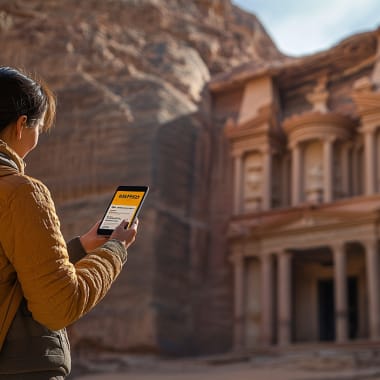
Currency and Payment Options in Jordan
How to Pay Safely and Cheaply in Jordan – with Dinar, Card or App.
How to Pay Safely and Cheaply in Jordan – with Dinar, Card or App.
Anyone planning a trip to Jordan cannot avoid the Jordanian Dinar (JOD). The national currency is not only the central means of payment in everyday life but also impresses with its stability and ease of use – a clear advantage for travelers who value planning security and transparent costs.
The Jordanian Dinar: An Overview
The Jordanian Dinar is divided into 100 piastres or 1,000 fils and is available in banknotes of 1, 5, 10, 20, and 50 dinars. Coins are available in various piastre and fil denominations. Particularly practical: The dinar is fully convertible and can be conveniently withdrawn from ATMs or exchanged at licensed exchange offices. For everyday payments – whether at the souk or in a restaurant – cash remains the preferred method, while hotels, larger stores, and restaurants usually also accept credit cards.
Security Features of Jordanian Banknotes
Jordanian banknotes have modern security features such as watermarks, security threads, microtexts, and color-changing effects that make counterfeiting difficult. A quick look against the light or a slight tilt of the banknote is often enough to verify its authenticity. For travelers, this means: With a little attention, the risk of counterfeit banknotes can be minimized.
Withdrawing Cash in Jordan
Even though credit cards are accepted in many areas of Jordanian everyday life, cash is often indispensable for travelers – especially in more rural areas or at markets. Good to know: Cash supply through ATMs works reliably in Jordan as long as you keep a few things in mind.
Finding Safe ATMs
In cities like Amman, Aqaba, or Petra, you can find numerous ATMs that accept international credit cards such as VISA and Mastercard. It is particularly safe to withdraw cash at ATMs inside bank branches or at airports – there, the machines are usually monitored by video and better protected against manipulation. ATMs on the street or in less frequented areas should be avoided. Those traveling to remote areas should equip themselves with enough cash beforehand, as the availability of ATMs in rural regions is often severely limited.
Foreign travelers require an activated credit card (VISA, Mastercard) or a debit card with Maestro or Cirrus logo. Important: V Pay cards do not work in Jordan. Most ATMs can be switched to English, which makes operation easier. Typically, you can withdraw up to 500 JOD per day – depending on the card type and bank policies.
Typical Fees for Withdrawing Cash
In Jordan, a fixed fee of around 4 JOD is usually charged for each withdrawal. Additionally, your home bank may charge fees for foreign withdrawals, often ranging from 1.75 to 4% of the withdrawn amount. To minimize fees, it is advisable to withdraw larger amounts at once. Also, make sure that the amount is settled directly in Jordanian Dinar (JOD) – this way you avoid unfavorable exchange rates that could arise from automatic conversions by the ATM.
Card Payment and Credit Card Acceptance
Although cash remains the first choice in many everyday situations, Jordan can be comfortably traveled by travelers with international credit cards – especially in cities and tourist areas. Nevertheless, it's worth taking a closer look at acceptance and the options for cashless payments.
Distribution of International Credit Cards
Visa and Mastercard are widely used in Jordan and are easily accepted in most larger hotels, restaurants, and shops. Car rental companies and international chains also typically work reliably with these card types. American Express is also accepted, but primarily in upscale hotels and selected tourist facilities.
However, in smaller restaurants, at markets, or in more remote regions, you should prepare for cash payments. Especially in souks, with street vendors, or at gas stations, card payment is hardly possible. Therefore, it's advisable to always carry a sufficient amount of cash – especially when traveling off the beaten tourist paths.
For card payment, entering a PIN is usually required, especially at modern payment terminals. In some cases, a signature may also still be required. V-Pay cards do not work in Jordan, and Girocards (EC cards) are unsuitable for payments – they can only be used at ATMs with a Maestro or Cirrus logo to withdraw cash.
Mobile Payment Options
In larger cities like Amman or Aqaba, many modern shops, hotels, and restaurants already allow contactless payment – for example, with Visa or Mastercard via Apple Pay or Google Pay. For smaller amounts, this often works without a PIN, while higher amounts require entering the secret number. In rural areas or with more traditional providers, mobile payment methods are hardly widespread.
Tip: A combination of credit card and cash gives you maximum flexibility – and protects against unpleasant surprises when card terminals are not functioning or simply not available.
Exchange Rate and Currency Exchange
A fair exchange rate and choosing the right provider can make a significant difference while traveling. In Jordan, you as a traveler benefit from a stable exchange rate and a transparently regulated exchange practice – ideal for stress-free planning of your travel budget.
Current Exchange Rate Rates
The Jordanian Dinar (JOD) is firmly pegged to the US dollar – a stability anchor in an otherwise often volatile region. The current rate is about 1 JOD = 1.41 USD or 1 JOD = 1.24–1.28 EUR (as of May 2025). Thanks to this peg, the exchange rate only fluctuates slightly, allowing for reliable calculations of travel costs. The rates are published daily by the Central Bank of Jordan, although minor differences between providers are possible. Thus, the Jordanian Dinar remains one of the most stable currencies in the Middle East – a clear advantage for international guests.
Trustworthy Exchange Offices
For cash exchange on-site, exchange offices in cities like Amman or Aqaba are recommended. They are not only widely available but typically offer the best rates – especially compared to hotels or airports. Important: A passport must be presented when exchanging. Banks are a safe and reputable alternative, albeit usually with slightly worse terms. Hotels may offer a convenient exchange service, especially upon late arrival, but the rates are often the most unfavorable there. Our tip: Only exchange as much cash as necessary – for larger expenses, ATMs or credit cards are usually better.
Safety and Fraud Protection
Jordan is generally considered a safe travel destination with a relatively low crime rate. Nevertheless, you should exercise particular caution when handling money, just as you would on any trip. With a watchful eye and some simple precautions, potential fraud risks can be significantly minimized.
Protection Against Fraud and Skimming
In busy areas like Amman or at heavily frequented tourist attractions, there can occasionally be pickpocketing. There are also known cases of staged traffic accidents where money demands are made – in such cases, do not agree to payments but contact the police. When withdrawing cash, it is advisable to only use official ATMs of large banks located in safe, well-lit areas. Avoid ATMs in hotels or secluded alleys. Always cover the PIN entry with your hand and do not get distracted. Skimming – reading card data – is rare but possible, so vigilance is the best protection here.
Storing Cash in the Hotel
Always keep cash and cards close to your body and separate from one another. For larger amounts of money, passports, or backup cards, it is best to use the safe in your hotel room. If no safe is available, valuables should be stored discreetly and securely in your luggage. Do not leave documents or valuables visible in the vehicle – not even for a short time. For daily needs, a manageable amount of cash is usually sufficient, especially for markets, taxis, and smaller restaurants where card payments are not common.
Tips for Cost Optimization
A Jordan adventure does not have to be a financial adventure – with the right strategies, fees and unnecessary costs can be easily avoided. Whether during currency exchange, card payments, or tipping: Those who plan cleverly save real money.
Dealing with Exchange Rates
The best way to obtain the Jordanian Dinar (JOD) at a fair rate is to exchange money locally. Exchange offices in cities often offer better rates than banks or hotels, while exchanging in Germany is usually associated with worse terms. Be sure to only exchange as much cash as you truly need – the buy-back can be expensive.
Even more efficient: Cash withdrawals with a travel credit card that allows fee-free transactions. Many direct banks offer such cards specifically for travelers. Check with your home bank about possible fees before your trip and avoid ATMs that charge additional operator fees. While card payments are convenient, they can incur foreign transaction fees of up to 4% depending on the merchant and card provider. Therefore, cash payments can often be cheaper for larger amounts.
Tipping Practice in Jordan
The proper handling of tips also counts. In Jordan, tipping is not mandatory but is appreciated as a sign of appreciation. In restaurants, tipping 5–10% of the bill is common, provided no service charge is included. Hotel staff appreciate small cash amounts, such as 1–2 dinars for the porter or room service. For guided tours, a tip of 2–5 dinars per day and person is recommended – depending on the duration and quality of the service.
It is best to always keep a small cash reserve in dinars ready to be flexible for any situation. This way, you show hospitality and respect – without financial surprises.
Discover the Orient with experts who have explored every corner themselves
Your dream holiday, tailor-made by experts.
We don't just know the Middle East from books, we visit the country several times a year to experience the culture, landscape and people first-hand.
From your first enquiry to your return home, we are there for you personally - by phone, email or WhatsApp, whenever you need us. Our trips are as unique as you are: individually planned and provided with exclusive privileges and high-quality arrangements that will make your trip unforgettable.
Experts for your Orient trip







